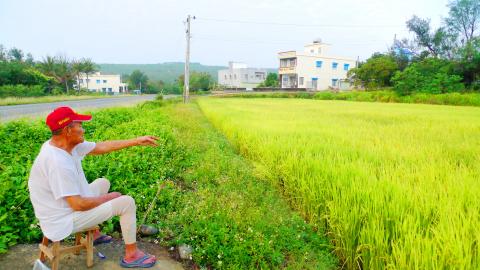The nation’s last whaler has passed away, taking with him a poorly recorded, but important part of Taiwan’s history.
Chang Yu-chen (張玉振), 90, was one of the first and last whalers working out of Pingtung County, where the nation’s whaling industry was based.
Whaling in Taiwan began in 1913, when the Japanese established the industry near Kenting’s Nanwan Beach (南灣), then called Osaka-rachi.

Photo: Copy by Tsai Tsung-hsien, Taipei Times
In the 1950s, the Chinese Nationalist Party (KMT) government moved the industry further south to Banana Bay (香蕉灣).
It was at about this time when Chang, 26, and already working in distant-water fishing, became a whaler.
He was invited to Pingtung to work for Hsiang Te Fisheries Corp in the bay, historian Nien Chi-cheng (念吉成) said.
Chang went on to work on the nation’s first post-Japanese colonial era whaling boat with Tsai Wen-chin (蔡文進), who became his close friend, and a Japanese harpoonist and mechanic.
The mechanic was unwilling to teach Chang, so he used his observations to pick up various skills on the boat and was quickly promoted, Nien said.
The crew in 1958 caught a record-sized whale, for which Chang was recognized by then-Pingtung mayor Ko Wen-fu (柯文福).
Ko and then-Hengchun Township mayor Kung Hsin-tung (龔新通) visited the Chang household along with former president Chiang Ching-kuo (蔣經國) and took a photograph with Chang’s mother, Nien said.
Chiang and his father, Chiang Kai-shek (蔣介石), were avid whale meat fans and frequently visited Pingtung to observe whaling industry operations, Nien said.
Taiwan at the time cooperated with Japan on whaling and the nation had only three whalers, including Chang, Nien said.
Due to the short whaling season from January to March, and increasing international pressure on the industry, whaling in Taiwan under the Republic of China lasted only 15 years, Nien said, adding that Chang went on to fish in local waters.
Chang in 1985 became the eighth director-general of the Hengchun Fishing Association, he added.
Nien said he hopes that the government will develop a whale-watching industry to capitalize on cetaceans that roam the waters off Taiwan’s southern coast, and that he will see the establishment of a whaling museum.

US climber Alex Honnold is to attempt to scale Taipei 101 without a rope and harness in a live Netflix special on Jan. 24, the streaming platform announced on Wednesday. Accounting for the time difference, the two-hour broadcast of Honnold’s climb, called Skyscraper Live, is to air on Jan. 23 in the US, Netflix said in a statement. Honnold, 40, was the first person ever to free solo climb the 900m El Capitan rock formation in Yosemite National Park — a feat that was recorded and later made into the 2018 documentary film Free Solo. Netflix previewed Skyscraper Live in October, after videos

Starting on Jan. 1, YouBike riders must have insurance to use the service, and a six-month trial of NT$5 coupons under certain conditions would be implemented to balance bike shortages, a joint statement from transportation departments across Taipei, New Taipei City and Taoyuan announced yesterday. The rental bike system operator said that coupons would be offered to riders to rent bikes from full stations, for riders who take out an electric-assisted bike from a full station, and for riders who return a bike to an empty station. All riders with YouBike accounts are automatically eligible for the program, and each membership account

NUMBERS IMBALANCE: More than 4 million Taiwanese have visited China this year, while only about half a million Chinese have visited here Beijing has yet to respond to Taiwan’s requests for negotiation over matters related to the recovery of cross-strait tourism, the Tourism Administration said yesterday. Taiwan’s tourism authority issued the statement after Chinese-language daily the China Times reported yesterday that the government’s policy of banning group tours to China does not stop Taiwanese from visiting the country. As of October, more than 4.2 million had traveled to China this year, exceeding last year. Beijing estimated the number of Taiwanese tourists in China could reach 4.5 million this year. By contrast, only 500,000 Chinese tourists are expected in Taiwan, the report said. The report

Temperatures are forecast to drop steadily as a continental cold air mass moves across Taiwan, with some areas also likely to see heavy rainfall, the Central Weather Administration (CWA) said. From today through early tomorrow, a cold air mass would keep temperatures low across central and northern Taiwan, and the eastern half of Taiwan proper, with isolated brief showers forecast along Keelung’s north coast, Taipei and New Taipei City’s mountainous areas and eastern Taiwan, it said. Lows of 11°C to 15°C are forecast in central and northern Taiwan, Yilan County, and the outlying Kinmen and Lienchiang (Matsu) counties, and 14°C to 17°C